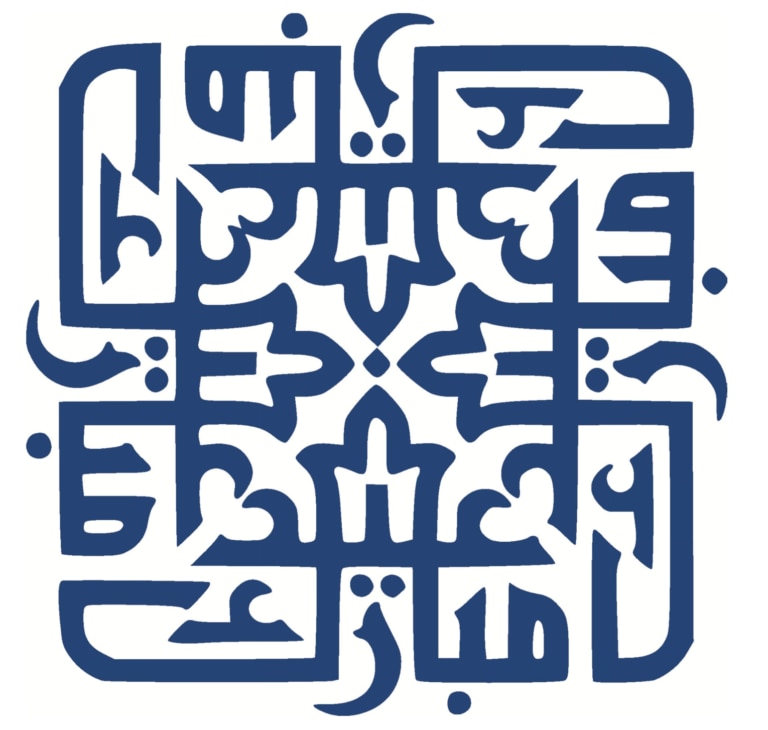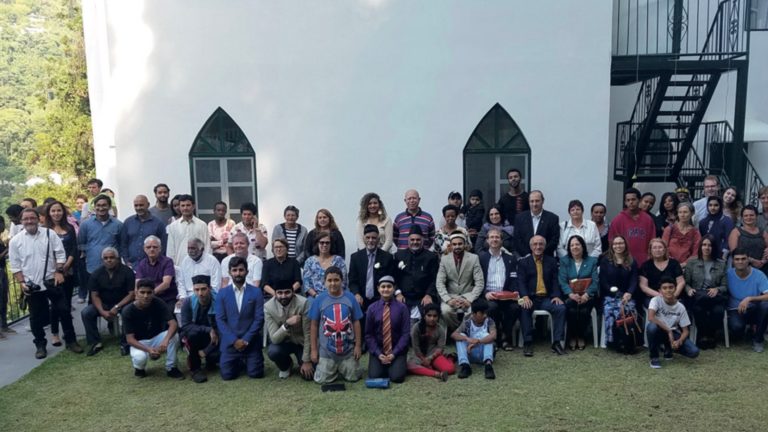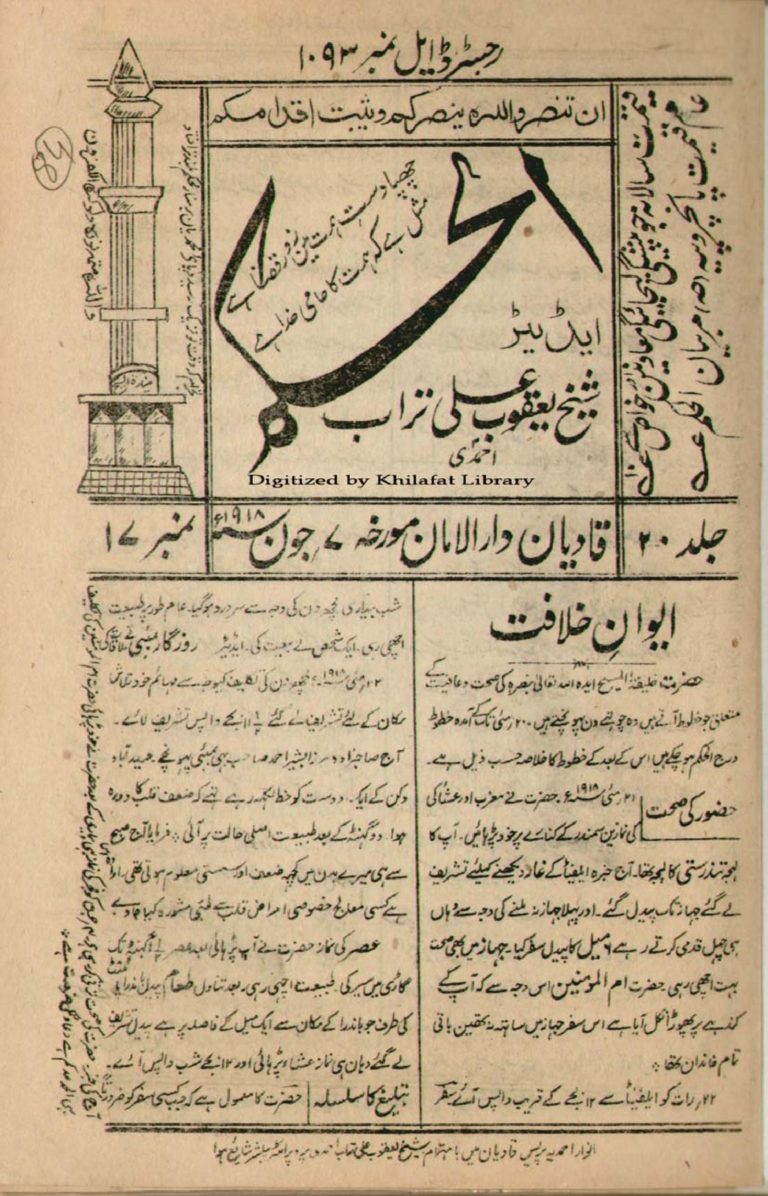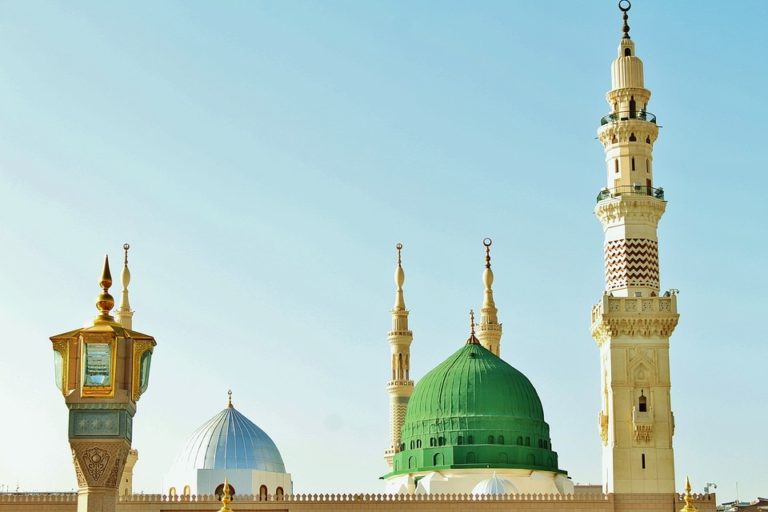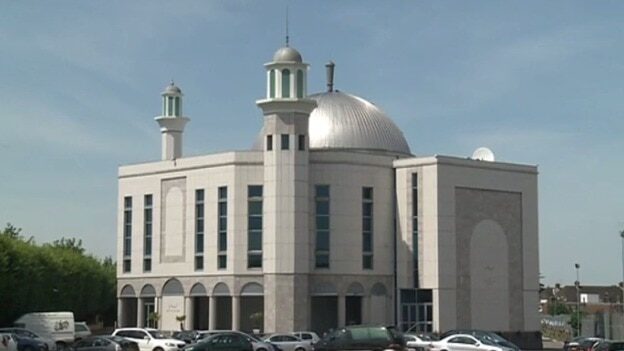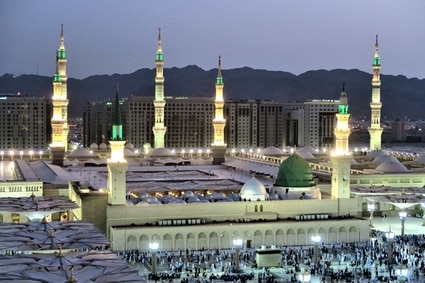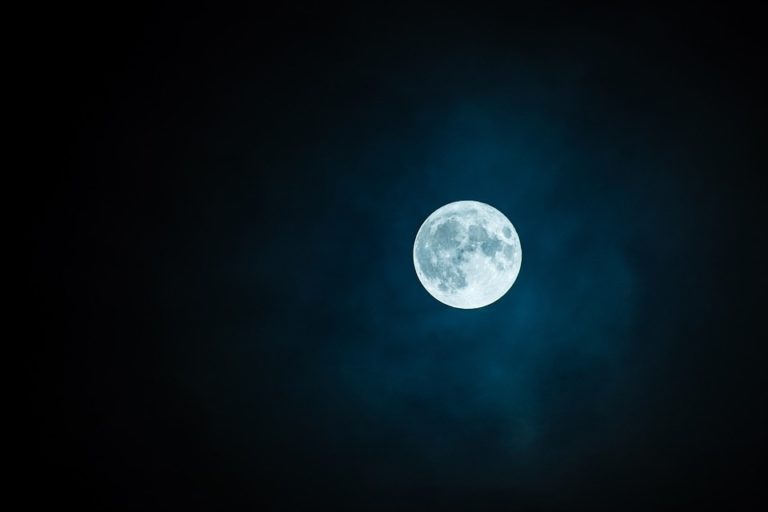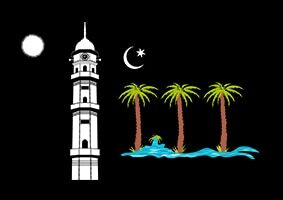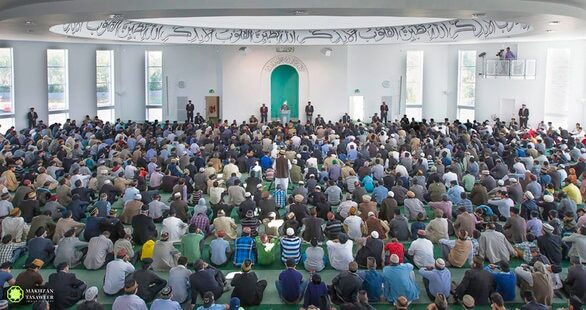Friday Sermon
11 May 2018
Men of Excellence
After reciting the Tashahhud, Ta‘awuz, and Surah Al-Fatihah, Hazrat Khalifatul Masih Vaa stated:
Today, the first Companion [of the Holy Prophetsa] whom I shall talk about is Hazrat Abdullahra bin Jahsh. His mother, Umaimah bint Abdul Muttalib, was one of the paternal aunts of the Holy Prophetsa. Thus, he was a cousin of the Holy Prophetsa. He had accepted Islam prior to the Holy Prophetsa going into Darul Arqam. (Usdul Ghaaba, Vol. 3, p.89, Abdullah bin Jahsh, Darul-Fikr, 2003, Beirut).
Darul Arqam was a house that belonged to Arqam bin Arqam, who had newly accepted Islam and was situated at the outskirts of Mecca. It served as a centre where Muslims would gather, learn about their faith and worship. Owing to this recognition, it was also known by the name of Darus Salam [The Abode of Peace]. This served as the centre [for Muslims] in Mecca for three years wherein they would discreetly worship and also where the Holy Prophetsa held gatherings. Later, when Hazrat Umarra accepted Islam, they began openly professing their faith. According to the traditions, Hazrat Umarra was the last person to accept Islam at that centre. (Sirat Khatam-un-Nabiyyeen, Hazrat Mirza Bashir Ahmad Sahib M.A., p. 129).
Nevertheless, Hazrat Abdullahra bin Jahsh had accepted Islam prior to the establishment of this centre. It is narrated that his family was also subjected to the oppression at the hands of the idolaters of Quraish. He migrated to Abyssinia twice, along with his two brothers Hazrat Abu Ahmad and Ubaidullah and his sisters Hazrat Zainab bint Jahsh, Hazrat Umme Habibah and Hazrat Himnah bint Jahsh. His brother, Ubaidullah, upon arrival in Abyssinia, had converted to Christianity and died there as a Christian. His wife Umme Habibah bint Abu Sufyan was still in Abyssinia at the time when her marriage to the Holy Prophetsa took place. (Usdul Ghaaba, Vol. 3, p.89, Abdullah bin Jahsh, Darul-Fikr, 2003, Beirut).
Hazrat Abdullah bin Jahshra, prior to his migration to Medina, came to Mecca and he took along all the members of the Dudan family from among his tribe of Banu Ghanam to Medina (who had all accepted Islam). These families left Mecca in such vast numbers that entire neighbourhoods were left deserted and many houses were sealed shut. (At-Tabaqat Al-Kubra Li Ibn Sa‘d, Vol. 3, p.49, Abdullahra bin Jahsh, Dar Ihya At-turath Al-Arabi, 1996, Beirut).
Presently, Ahmadis in various places of Pakistan are experiencing similar circumstances where certain villages have been completely deserted. Ibn Ishaq states that when Banu Jahsh bin Rayab emigrated from Mecca, Abu Sufyan bin Harb sold his house to Amr bin Alqamah. When this news reached Hazrat Abdullahra bin Jahsh at Medina, he related it to the Holy Prophetsa. Upon hearing that, the Holy Prophetsa said, “O Abdullah! Are you not content with the fact that God will grant you a palace in Paradise in its place?” Hazrat Abdullah bin Jahshra replied, “Yes indeed, O Messenger Of Allahsa! I am content.” Upon this, the Holy Prophetsa said, “Then, those palaces will be granted to you.” (Sirat Ibn-e-Hisham, p. 352, Bab Hijratul Rasool, Darul Kutb-ul-Ilmiyah, 2001, Beirut)
By this the Holy Prophetsa meant that in place of the houses which he had left behind, he will be granted a station in the Heavens where palaces will be prepared for him.
The Holy Prophetsa sent Hazrat Abdullahra bin Jahsh on an expedition to the Valley of Nakhlah. The following account is recorded in the [Islamic] literature:
“One day, after performing the Ishaa prayer, the Holy Prophetsa said to Hazrat Abdullahra bin Jahsh, “Come armed in the morning as I wish to send you somewhere.”
Hence, when the Holy Prophetsa completed the Fajr [dawn] prayer, he found Hazrat Abdullahra bin Jahsh waiting at his door equipped with his bow and arrow and also a spear and shield. The Holy Prophetsa called for Hazrat Ubai bin Ka’bra and instructed him to write a letter. After the letter had been written, he called for Hazrat Abdullahra bin Jahsh and whilst giving him the letter, the Holy Prophetsa told him that he was appointing him as the leader of the expedition. From historical accounts we find that initially the Holy Prophetsa appointed Hazrat Ubaida bin Harithra as the leader of this expedition. However, when he returned home in order to prepare himself, his children came to the Holy Prophetsa and began to cry. Upon this, the Holy Prophetsa sent Hazrat Abdullahra bin Jahsh in his place as their leader. At the time of his departure, the Holy Prophetsa gave him the title of Amir-ul-Mu’mineen [leader of the faithful]. In Sirat-ul-Halbiya it is written that Hazrat Abdullahra bin Jahsh was thus the first fortunate companion to have received the title of Amir-ul-Mu’mineen in the Islamic era. (Al-Sirat-ul-Halbiya, Vol.3, pg.217, Sariyyat-ul-Abdullah bin Jahsh ilan Batne Nakhla, Darul Kutb-ul-Ilmiyah, 2002, Beirut.)
Under the commentary of the verse:
يَسْـَٔلُوۡنَكَ عَنِ الشَّهۡرِ الْحَرَامِ قِتَالٍ فِيۡهِ
[They ask thee about fighting in the Sacred Month ]Hazrat Musleh-e-Mau’udra has mentioned this incident in these words that even after the Holy Prophetsa had migrated from Mecca to Medina, the severity of the hostility from the Meccans did not subside. They began to threaten the people of Medina that since they had given refuge to their people, there was only one option; either kill all of them or expel them from Medina. Otherwise, they would vow to attack Medina and kill all of them and also capture their women. Moreover, this was not limited to mere threats, in fact they began to make preparations in order to attack Medina. In those days, the circumstances were such that the Holy Prophetsa would at times stay awake the entire night. Similarly, the companions would sleep equipped with their weapons, lest the enemy would suddenly launch an attack on them in the darkness of the night. In these circumstances, on the one hand, the Holy Prophetsa started to make treaties with the tribes living in the surroundings of Medina so that they would support Muslims if such circumstances arose. On the other hand, as a result of the news that the Quraish were making preparations for an attack, the Holy Prophetsa sent Hazrat Abdullahra bin Jahsh to Nakhla with twelve men. He gave him a letter and instructed him to open it after two days. Hazrat Abdullahra bin Jahsh opened it after two days and it stated that they should remain in Nakhla and gather information about the circumstances of the Quraish and report back. Incidentally, during that same period a small caravan of the Quraish passed by, which was returning from trade in Syria. Hazrat Abdullahra bin Jahsh through a personal initiative attacked them, as a result of which one person from among the disbelievers, Amr bin Al-Hazrami was killed, and two people were taken as captives and the Muslims also seized their possessions. When they returned to Medina and informed the Holy Prophetsa of this incident, he expressed great displeasure and said that he had not permitted them to fight and he also refused to accept any of the items they had captured from them. Ibn Jarir has taken the narration of Hazrat Ibn Abbasra and written, “The mistake Hazrat Abdullahra bin Jahsh and his companions made was that they believed that the month of Rajab had not yet commenced, even though it had already begun. They believed that it was the thirtieth of Jumada Al-Thani and that the month of Rajab had not yet started. In any case, the idolaters started to raise a hue and cry at the fact that Amr bin Al-Hazrami was killed at the hands of Muslims and that Muslims no longer respected the sanctity of the sacred months, in which all forms of war were forbidden.”
Hence, Hazrat Musleh-e-Mau’udra states, “God Almighty addresses this allegation in this very verse by stating that although God Almighty is most displeased by fighting in these months and is a sin in the sight of God Almighty, however it is even more displeasing to Him that people are hindered from the path of God Almighty; to stop them from professing the unity of God Almighty; to disregard the sanctity of the Al-Haram Mosque and to expel people from their homes simply because they believe in the One God. They may have thought of this one aspect. However, they have not reflected on the severity of their own sins and the displeasing deeds they have committed by rejecting God and His Messengersa, disregarding the sanctity of the Al-Haram Mosque and by expelling the people from their homes. When they themselves are guilty of such abhorrent acts, how then can they then raise allegations against Muslims? They have merely committed an inadvertent mistake, whereas the Meccans have been actively and intentionally committing these acts.” (Tafsir-e-Kabir, Vol.2, pp. 474-47 – Ch.2, V.218).
Elaborating on a Hadith [tradition of the Holy Prophetsa] of Bukhari, Hazrat Sayyid Zain-ul-Abideen Waliullah Shah Sahibra has mentioned the positive outcome of the expedition of Abdullahra bin Jahsh. Elaborating on this, he has written, “The accounts inform us that this expedition was completely successful with regards to the purpose it had been sent out for. By taking captives, they gained concrete and precise information of the schemes and movement of the Quraish of Mecca. The incident related to the caravan of Hazrami was something that was unintentional and incidental. The opinion of some historians, who have mentioned that some members of this expedition thought of avenging and returning the captured possessions of the Muhajireen [Muslims who migrated from Mecca to Medina] is incorrect. Rather, the primary objective of this expedition was merely to obtain, through this delegation of Hazrami, sound and precise information of the real purpose of the caravan under the leadership of Abu Sufyan bin Harb and the schemes of war made by the Quraish of Mecca. This was precisely what had been conveyed to them in secrecy and therefore, they did not let this opportunity of capturing this small caravan go to waste. It is a far-fetched idea to believe that they were actually sent in order to obtain information about the schemes of war made by the Quraish of Mecca, however they sufficed with simply looting this caravan and returning to the Holy Prophetsa. Hazrat Abdullah bin Jahshra was a companion of a very lofty status. He was also the paternal cousin of the Holy Prophetsa. The Holy Prophetsa had appointed an extremely reliable and trustworthy person for this expedition. When the Holy Prophetsa learnt of the plans of war being made by the Quraish of Mecca, he also started making preparations and he did so in a most discreet manner.” (Sahih Al-Bukhari Tarjuma Wa Sharah, Hazrat Sayyid Zain-ul-Abideen Waliullah Shah Sahib, Vol.8, pg. 15, Kitabul Maghazi, Baab Qisa Ghazwa Badr, Zia-ul-Islam Press, Rabwah).
He further writes, “Even though in the narrations related to war we find that the Holy Prophetsa expressed displeasure towards Hazrat Abdullahra bin Jahsh and his companions, however this admonishment was appropriate and justified as their expedition created circumstances which could have been the cause of discord. Nonetheless, at times certain actions which apparently seem to be mistakes, are in fact carried out in accordance with Divine will and some insignificant incidents bear magnificent results. Thus, it was quite possible that the expedition led by Abdullahra bin Jahsh would have never been sent and the events would not have unfolded in the manner they did. Similarly, the caravan led by Abu Sufyan would have reached Mecca without any hindrance and the Quraish would have attacked the Muslims with full preparation, which would have been really difficult for the ill-equipped companions of the Holy Prophetsa. However, the incident caused by Abdullahra bin Jahsh enraged the arrogant Quraish leaders. They hastily assembled an army of a thousand soldiers and arrived at Badr in a state of conceited rage to save their convoy. Little did they know that their fates had been sealed at they very place. On the other hand, it was equally possible that if the companions had known they would be facing a fully equipped army, some of them may have shown hesitation. Thus, this act of secrecy served as a disguise, known as camouflage today.” (Sahih Al-Bukhari Tarjuma Wa Sharah, Hazrat Sayyid Zain-ul-Abideen Waliullah Shah Sahib, Vol.8, pg. 17, Kitabul Maghazi, Baab Qisa Ghazwa Badr, Zia-ul-Islam Press, Rabwah).
According to the historical accounts, “love of God and His Prophetsa had made the companions oblivious to all material desires. Their only wish was to sacrifice their lives in God’s cause. Their desire was indeed fulfilled and they became distinguished as ‘Al-Mujjadu Fillah’ (the one who lost his ear in God’s cause). (Usdul Ghaaba, Vol. 3, p.90, Abdullah bin Jahsh, Darul-Fikr, 2003, Beirut).
In relation to more details about his character, there is a well-known account of how Abdullahra bin Jahsh’s prayers were accepted before he was martyred. Ishaq bin Sa’dra bin Abi Waqas narrates with reference to his father, “On the day the Battle of Uhud, his father i.e. Sa’d requested Abdullah bin Jahsh to come to one side in order to pray together. They retreated to one side and Sa’d prayed first that ‘O Allah! When I meet the enemy tomorrow, let me face someone who is the most fearsome in battle and commands great aura. Let me fight him and let me kill him for Your sake. Let me seize his weapons.’ Upon this Hazrat Abdullahra bin Jahsh said Ameen. After this Hazrat Abdullahra bin Jahsh prayed: ‘O Allah! When I meet the enemy tomorrow, let me face someone who is most fearsome in battle and commands great aura. Let me kill him, and let him overcome me and kill me and take hold of me and cut off my ears and nose. When I come before You, that You ask me, “O Abdullah! Why have your nose and ears been cut off?” and I should answer: “O Allah, they were severed in Your way and in the way of Your Prophetsa”, and you reply, “You indeed speak the truth.”’” Hazrat Sa’d says, “Abdullah bin Jahsh’s prayer was better than mine, because towards the end of the day I saw that his nose and ears were hanging on a thread, meaning that a thread had been through them.” (Usdul Ghaaba, Vol. 3, p.90, Abdullah bin Jahsh, Darul-Fikr, 2003, Beirut).
This was a cruel practice used by the disbelievers. Even today, some extremist Muslims are indulging in this practice in Islam’s name. Hazrat Muttalib bin Abdullah bin Hantab narrates, “On the way to Uhad, the Holy Prophetsa stayed in a place near Medina called Shaikhain. Hazrat Umme Salmara presented roasted shoulder meat which the Holy Prophetsa ate. Then she brought Nabiz, the Holy Prophetsa drank from it (I believe it is something similar to a milk-based drink). Someone then took the cup of Nabiz and drank from it and then Abdullah bin Jahsh took the cup and finished it. Another person then said, ‘give me some to drink also, for you know where you are going tomorrow.’ Abdullahra bin Jahsh replied, ‘Yes, I would like to meet my Lord in a quenched state rather than that of thirst.’” (At-Tabaqat Al-Kubra Li Ibn Sa‘d, Vol. 3, p.50, Dar Ihya At-Turath Al-Arabi, 1996, Beirut).
What wonderful ways the companions had of demonstrating their love for God Almighty and what wonderful preparation they undertook to meet Him.
Hazrat Abdullahra bin Jahsh and Hazrat Hamzara bin Abdul Muttalib were both buried together in one grave. Hazrat Hamzara was the uncle of Hazrat Abdullahra bin Jahsh and at the time of his martyrdom he was a little over 40 years old. The Holy Prophetsa was the custodian to his inheritance, and so the Holy Prophetsa purchased goods during the Battle of Khaibar and gave them to his son. (Usdul Ghaaba, Vol. 3, p.90, Abdullah bin Jahsh, Darul-Fikr, 2003, Beirut).
Hazrat Abdullah bin Jahshra was also renowned as an authority with sound opinions and advice. At the time of the Battle of Badr, Hazrat Abdullah bin Jahshra was among those Companions from whom the Holy Prophetsa took counsel. (Al-Isti‘ab fi Ma’rifatil Ashaab, Vol. 3, p.16, Abdullah bin Jahsh, Darul Kutub-ul-Ilmiya, 2002, Beirut).
Hazrat Musleh Mau’udra narrates the incident of the Holy Prophetsa regarding the sister of Hazrat Abdullah bin Jahshra whilst they were returning from the Battle of Uhud. He states that this has been recorded in history, or he has narrated it in his own words, that in the Battle of Uhud, it can be witnessed just how the Holy Prophetsa displayed great courage and his high morals and how he was compassionate to the people and won their hearts. From the state of affairs of this battle, one can begin to understand the heights of his moral condition and appreciate the unrivalled sacrifices of his Companions. Hazrat Musleh Mau’udra writes, “I speak of that time when the Holy Prophetsa was returning to Medina after the battle had ended. When the women of Medina had heard news of the martyrdom of Abdullahra bin Jahsh, they became extremely anxious and when they heard the Holy Prophetsa was returning, they waited at a short distance outside of Medina to welcome him. Among them was his sister-in-law, Himnara bint Abi Jahsh three of whose close relatives had been martyred during the battle. When the Holy Prophetsa saw her, he told her to grieve over her loss. This is an Arabic idiom which means that I am informing you of the death of your relative. Himnara bint Jahsh replied, ‘O Messenger of Allah! Who shall I grieve over?’ The Holy Prophetsa answered, ‘Your uncle Hamzara has been martyred.’ Upon hearing this Hazrat Himna said, ‘Surely to Allah we belong and to Him shall we return’ and then said ‘May God elevate his status, he was met with a prosperous end.’ Then the Holy Prophetsa said, ‘Himna! Now grieve over another loss’. Hazrat Himnara replied ‘O Messenger of Allahsa! Whom shall I grieve over?’ He answered, ‘your brother Abdullahra bin Jahsh has been martyred.’ Himna again said, ‘Surely to Allah we belong and to Him shall we return, all praise is due to God, he was met with a prosperous end.’The Holy Prophetsa then said, ‘Now grieve over another loss’. Hazrat Himnara replied, ‘O Messenger of Allahsa! Whom shall I grieve over?’ The Holy Prophetsa replied, ‘Your husband was also martyred.’ When she heard this, tears fell from Hazrat Himna’s eyes and she replied, ‘Woe unto me’ The Holy Prophetsa then said, ‘Look how strong the bond is between a woman and her husband. When I informed Himna of the death of her uncle she said ‘Surely to Allah we belong and to Him shall we return’; when I informed her of the death of her brother she again said, ‘Surely to Allah we belong and to Him shall we return’, but when I informed her of the death of her husband, she heaved a sigh and said, ‘Woe unto me’ and was unable to hold back her tears with all the grief.’ The Holy Prophetsa then said, ‘In such circumstances women forget all their close relatives and blood-relations and she remembers her loving husband.’ Thereafter he asked Hazrat Himnara, ‘Why did you say woe unto me?’ She replied, ‘O Messenger of Allah! His son came to my mind as to who would now take care of him.’”
(Aside from the love for her husband – if a husband is loving only then will a wife fondly remember him – however, she showed great concern for their children. This is a lesson for men and women today that you should become loving husbands and women should become such mothers who care about their children. Furthermore, to become such loving husbands you must fulfil the rights of your wives and children and many complaints are received in this regard nowadays that rights are not being upheld.)
“How beautiful is the statement of the Holy Prophetsa. He said to Himnara, ‘I pray to God Almighty that He brings forth someone who takes even better care than your husband (i.e. taking care of the children in an even better manner).’ It was a result of this prayer that Himnara was married to Hazrat Talhara and they had a son, Muhammad bin Talha. However history tells us that Hazrat Talhara did not show as much love and compassion to Muhammad bin Talha as he did to the previous children of Himnara. People would say that no one could love their step-children as much as Talhara did. All of this was a result of the prayers of the Holy Prophetsa. (Masaib Ke Neeche Barkatoun Ke Khazane Makhfi Hote Hain, Anwar-ul-Uloom, Vol.19, pp. 56-57).
The second Companion is Hazrat Ka’b bin Zaidra. His name was K’ab bin Zaid bin Qais bin Malik and he was from the Banu Najjaar tribe. He took part in the Battle of Badr and was martyred in the Battle of Khandaq [Ditch]. It is said he was hit with the arrow of Umaya bin Rubiya bin Sakhr. He was from among the Companions of Bir Maona, where all the other Companions were killed however he was the sole survivor. (Al-Isti‘ab, Vol. 3, p.376, Darul Kutub-ul-Ilmiya, 2002, Beirut).
Bir Maona is where the Holy Prophetsa – on the request of a tribe – sent 70 of his companions, a large party of whom were Huffaz [had memorized the entire Quran] and were Qaris [those who are able to read the Qur’an according to its proper rules of recitation]. They had been deceived and all of them were martyred with the exception of Hazrat Ka’bra. Hazrat K’abra survived because he had climbed up a mountain. According to some narrations, the disbelievers attacked and injured him severely. Perceiving him dead, the disbelievers left him whereas he was actually alive. He soon returned to Medina and returned to good health.
The third Companion is Hazrat Saleh Shuqraanra. His name was Saleh and his title was Shuqraan and he was known by this appellation. Hazrat Saleh Shuqraanra was a freed Abyssinian slave of Hazrat Abdullah bin Aufra. The Holy Prophetsa chose him for his services and purchased him from Hazrat Abdullahra. According to certain other narrations, Hazrat Abdur Rahman bin Aufra handed him over without recompense. (Usdul Ghaaba, Vol. 2, p.392, Shuqraan, Darul-Fikr, 2003, Beirut).
Hazrat Saleh Shuqraanra participated in the Battle of Badr. Since he was not free and was in servitude, hence the Holy Prophetsa had not allocated a share to him. The Holy Prophetsa appointed Hazrat Saleh Shuqraanra to oversee the prisoners. The prisoners he oversaw would themselves give remuneration and so Hazrat Shuqraanra received even more from the spoils of war. (Sirat ibn Kathir, Baab Zikre Ubaida…pg.750, Darul Kutubil Ilmiyya, 2005, Beirut)
Although he did not have a share allocated from the spoils of war, however, due to this responsibility, he received even more than the spoils of war. After the Battle of Badr, the Holy Prophetsa set him free. (Usdul Ghaaba, Vol. 2, p.392, Shuqraan, Darul-Fikr, 2003, Beirut).
Hazrat Jafir bin Muhammad Sadiqra says that Hazrat Shuqraanra was from among the Ahle Sufa [those Companions who had devoted themselves to remain in the company of the Holy Prophetsa]. (Huliyatul Auliya, Vo.1, pg.348, Zikr Ahle Sufa, Maktabtul Imaan Al-Mansoora, 2007).
Hazrat Shuqraanra was from among the Companions who would sit in the company of the Holy Prophetsa. He also had the honour of taking part in the Ghusl [washing ritual of deceased body in Islam] and burial of the Holy Prophetsa. (Al-Asabaa, Vol.3, pg.248, Shuqraan, Darul Kutubil Ilmiyya, 2005, Beirut).
Hazrat Ibn Abbasra states that the Holy Prophetsa was given Ghuslwith his clothes on. Hazrat Alira , Hazrat Fazal bin Abbasra, Hazat Qutham bin Abbasra, Hazrat Shuqraanra and Hazrat Owais bin Khawalira entered the burial area of the Holy Prophetsa. (Al-Sunan Al-Kubra li-Al-Bahqi, Vol.4, pg.84, Hadith: 7143, Maktabat-ul-Rushd, 2004, Riyadh).
About the burial, Hazrat Shuqraanra states, “I swear by God, it was I who laid the velvet cloth under the body of the Holy Prophetsa.” (Sunan Al-Tirmadhi, Kitab-ul-Janaiz, Hadith: 1047)
According to a tradition of Sahih Muslim it was a red velvet cloth. (Sahih Muslim, Kitab-ul-Janaiz, Hadith: 2241).
This cloth was used by the Holy Prophetsa and so Hazrat Shuqraanra relates that I did not wish for anyone else to use this cloth after the demise of the Holy Prophetsa as he would often use this as a garment and would lay it out. (Al-Minhaj Bushra, Sahih Muslim Az Imam Noovi, pg.749, Kitabul Janaiz, Hadith: 967, Daru Ibn Hazam, 2002).
At the Battle of Muraysi, Hazrat Shuqraanra was appointed to oversee the wealth, weapons and livestock etc. that were obtained from the opposing camps. (Imta-ul-Asmaa, Vol.6, pg.316, Darul Kutubil Ilmiyya, 1999, Beirut).
He was very trustworthy and dependable and would oversee matters. It is mentioned that Hazrat Umarra sent Hazrat Abdur Rahmanra, who was the son of Hazrat Shuqraanra, towards Hazrat Abu Musa Asharira. Hazrat Umarra wrote that I am sending you a pious man, Abdur Rahman son of Saleh Shuqraan, who was a slave freed by the Holy Prophetsa. Treat him by keeping in consideration the status the Holy Prophetsa gave to his father. (Al-Asabaa, Vol.5, pg.31, Abdur Rehman bin Shuqraan, Darul Kutubil Ilmiyya, 2005, Beirut).
Such was the great status given to slaves by Islam. Islam not only granted freedom to slaves but in fact also gave respect and dignity to their children. One narration mentions that Hazrat Shuqraanra took residence in Medina and he also had a home in Basra. He passed away during the era of the Khilafat of Hazrat Umarra. (Al-Asabaa, Vol.3, pg.285, Shuqraan, Darul Kutubil Ilmiyya, 2005, Beirut), (Imta-ul-Asmaa, Vol.6, pg.316, Darul Kutubil Ilmiyya, 1999, Beirut).
Next, I shall talk about Hazrat Malik bin Dukhshumra. He was from the Khazraj tribe and the family of Banu Ghanam Bin Auf. He had a daughter named Furiya. (At-Tabaqat Al-Kubra, Vol. 3, p.282, Malik bin Dukhshum, Dar Ihya At-Turath Al-Arabi, 1996, Beirut).
The scholars dispute whether Hazrat Malik bin Dukhshum took part in the Baiat of Uqba or not. According to Ibn Ishaq and Musa bin Utba, he was a part of it. In any case, the difference of opinions amongst the scholars continues. Hazrat Malik took part in the Battle of Badr, Khandak and all other battles alongside the Holy Prophetsa. (Al-Isti‘ab, Vol. 3, pp.405-406, Malik bin Dukhshum, Darul Kutub-ul-Ilmiya, 2002, Beirut).
Suhail bin Amr was amongst the senior and respected leaders of the Quraish. He was part of the Battle of Badr on the side of the idolaters and was captured by Hazrat Malik bin Dhuhshumra.
The traditions mention that Amir bin Sa’dra narrates from his father, Hazrat Sa’d bin Abi Waqasra, “On the day of the Battle of Badr, I fired an arrow at Suhail bin Amr which pierced through one of his arteries. I followed the trail of blood and I saw that Hazrat Malik bin Dukhshumra was holding him by the hair on his forehead. I said this is my prisoner as I fired the arrow at him, however Hazrat Malik said this is my prisoner as I have seized him. They both took Suhail before the Holy Prophetsa, who took Suhail from both of them however at Roha, Suhail escaped from the grasp of Hazrat Malik bin Dukhshumra. Hazrat Malik called out loudly among the people and set out to find him. The Holy Prophetsa said whoever finds him should kill him.”
(This is because he had come to wage war against the Muslims and escaped as a prisoner and therefore he was a threat of danger if he reappeared. Nevertheless, he was a prisoner of war and thus this instruction was given.)
“However, since he was destined to survive. And so, instead of anyone else finding him, Suhail bin Amr was in the end found by the Holy Prophetsa. Since he was found by the Holy Prophetsa, he did not kill him.”
This is the lofty example set by the Holy Prophetsa and serves a rebuttal to those unjust people who allege that the Holy Prophetsa committed injustices and caused bloodshed. Despite encountering the individual about whom the death penalty had been ordained, he still did not kill him. According to one narration, “The Holy Prophetsa found Suhail amongst the acacia trees. The Holy Prophetsa instructed to tie him up and so his hands were tied with his neck. In other words, he was imprisoned.” (Tarikh-e-Dimashkh Li-ibn-e-Asaqar, Vol. 12, p. 333, Suhail bin Amr bin Abdu Shams, Dar Ihya At-Turath Al-Arabi, Beirut).
There is a Hadith in Sahih Al-Bukhari narrated by Hazrat Itban bin Malikra, who was among those Ansari Companions who fought in the Battle of Badr, in which he stated that he went to see the Holy Prophetsa and said, “O Messenger of Allah! My eyesight has weakened significantly. I usually lead the prayers for my people. When it rains heavily the path between my place of residence and the mosque becomes flooded and I cannot lead the prayer. It is my wish O Messenger of Allahsa that you come to my home and offer your prayers here, after which I will turn my house into a mosque.” The Holy Prophetsa replied, “Insha-Allah [God willing] I will come.” He then said, “One morning, the Holy Prophetsa and Hazrat Abu Bakrra came to my home after sunrise. Upon reaching the door, the Holy Prophetsa requested permission to enter. I permitted them to enter. When the Holy Prophetsa entered the home he did not sit down, rather he asked, ‘Which part of the house do you wish for me to offer prayers?’ I pointed to a corner of the house where I wished for him to offer prayers. The Holy Prophetsa stood up for prayer and said ‘Allahu Akbar’. We stood forming a row for the prayers. He led two units of prayer and then offered the salaam [signalling the end of prayer].”
The narrator then says, “I offered him Khazeerah (a dish prepared from meat and flour or bread) due to this the Holy Prophetsa stayed a while longer.”
The narrator further states, “Some other residents of the area also gathered together in the house. One of them said, ‘Where is Malik bin Dukhshum?’ One of them replied, ‘He is a hypocrite and has no love for Allah nor His Messengersa.’” As he lived nearby, perhaps he said this because he did not attend the gathering. Upon hearing this, the Holy Prophetsa said, “Do not say this. Do you not see that he professes the Islamic creed of La Ilaha Illallah [There is none worthy of worship except Allah] in the hope of attaining the pleasure of God?” The one who said the aforementioned statement then said, “God and His Messengersa know best”. He then said: “We only see him showing his attention and compassion towards the hypocrites.” (Perhaps due to his kind nature, he wished to spread the message to the hypocrites and thus through this he would bring them closer to Islam. That is why he had compassion for them and owing to this, a misunderstanding developed within some of the companions.) The Holy Prophetsa then said, “Verily God Almighty will forbid the fire to touch that individual who declares La Ilaha Illallah, on the condition that it is pronounced keeping the pleasure of God in mind”. (Sahih Al-Bukhari, Kitab-ul-Salat, Baab Al-Masajid Fi Al-Buyut, Hadith: 425)
This is the response to all the so-called scholars who brandish the edict of kufr [disbelief] and with regards to Ahmadis they commit atrocities. It is the edicts of these so-called scholars that have destroyed the peace within the Muslim countries. At present, in Pakistan there is an organisation by the name Labbaik Ya Rasulallah. They raise many slogans, but the real meaning of Labbaik Ya Rasulallah would be to act on this saying of the Holy Prophetsa and refrain from labelling anyone a “non-Muslim” who attests to La Ilaha Illallah. God Almighty has made the fire [of Hell] forbidden for that individual who affirms this keeping the Will of God in mind. These people say that we do not pronounce this declaration keeping the Will of God in mind. Do these people know what is concealed in the hearts more than the Holy Prophetsa? May God Almighty protect the people from this organisation.
In another narration it is stated that Hazrat Itban bin Malikra said to the Holy Prophetsa that Hazrat Malik bin Dukhshumra is a hypocrite. To this the Holy Prophetsa said, “Does he not profess La Ilaha Illallah?” Itban replied, “Indeed he does, however his profession is not genuine”. The Holy Prophetsa then asked, “Does he not offer his prayers?” He replied, “Indeed he does, however it cannot be deemed as prayers.” (Perhaps in those days there were certain people who of were stern nature, the likes of which we see among the religious clerics today). The Holy Prophetsa then said, “It is such people about whom God Almighty has stopped me from passing any sort of judgement.” (Usdul Ghaaba, Vol. 4, p.230, Malik bin Dukhshum, Darul-Fikr, 2003, Beirut).
Only God Almighty knows what is concealed in the hearts. God Almighty stopped the Holy Prophetsa from passing any judgement, however, these scholars seem to have a licence to commit all sorts of atrocities in God’s name, especially the clerics of Pakistan.
Hazrat Anas bin Malikra relates that Hazrat Malik bin Dukhshumra was slandered in front of the Holy Prophetsa who then said,
لَا تَسُبُّوْا اَصْحَابِيْ
Meaning, “Do not insult and malign my companions.” (Al-Isti‘ab, Vol. 3, pg.406, Malik bin Dukhshum, Darul Kutub-ul-Ilmiya, 2002, Beirut).
On the way back from the Battle of Tabuk, the Holy Prophetsa stopped near Medina at a place called Ze’awan. During this stay, the Holy Prophetsa was informed about Masjid Al-Zarar through revelation. The Holy Prophetsa called for Hazrat Malik bin Dukhshumra and Hazrat Ma’an bin Adira and ordered them to go towards Masjid Al-Zarar. Hazrat Malik bin Dukhshumra and Hazrat Ma’an bin Adira went to the Banu Salim tribe, which was the tribe of Hazrat Malik bin Dukhshumra. Hazrat Malik bin Dahshamra said to Hazrat Ma’anra to wait for him to bring something with which he could light a fire with. He went home and brought a dried date palm branch lit on fire. They then went towards Masjid Al-Zarar and, according to narrations, they arrived between Maghrib and Isha prayers. They set it alight and it burned to the ground. (Sharah Al-Zarqani, Vol.4, pp.97-98, Ghazwa-e-Tabuk, Darul Kutub-ul-Ilmiya, 1996, Beirut).
Thus, we should not be making assertions about Companionsra based on ill suspicion. It was assumed that perhaps he deviated from the right path to the extent that he was accused of being a hypocrite. However, later he became the one who destroyed the centre of the hypocrites under the instructions of God Almighty.
May God Almighty continue to elevate the status of the Companionsra. May He enable us to assess ourselves as to whether or not we are acting on the instructions of God Almighty.
(Translated by The Review of Religions)



